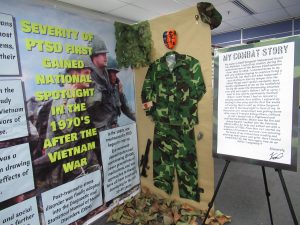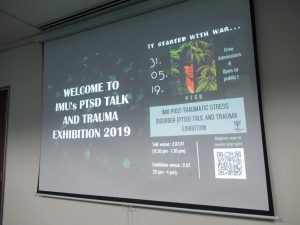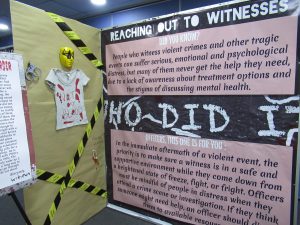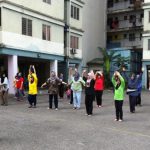31 May 2019 – International Medical University (IMU)’s Psychology Club held a Post-Traumatic Stress Disorder (PTSD) Talk and Trauma Exhibition. The talk was attended by around 50 participants whereas the exhibition hosted numerous visitors throughout the time frame of the event. The talk was conducted by two clinical psychologists who are also psychology lecturers at IMU, Puvessha Jegathisan, and Cheryl Tham Sin Yi. They are both skilful clinical psychologists with vast experience in treating PTSD clients and many more psychological disorders. Additionally, they have also worked together in treating refugees and asylum-seekers who underwent traumatic events within their lifetime. The objective of both the talk as well as the exhibition was to shed light on the actual severity of the word “trauma” and what it means to have gone through a traumatic event in a person’s lifetime as well as the psychological effects that arises from it. The perceived stigma that arises with regards to seeking mental help after enduring a traumatic situation was also a planned topic of discussion. This event also aimed to cultivate the use of art and narratives as a way of raising awareness on a particular issue.
| General Overview of PTSD |
|---|
| Puvessha began the talk by introducing the term PTSD as well as discussing on who might be more prone to developing this disorder. “A person may develop PTSD after experiencing or witnessing a traumatic event, however what may be traumatic to you may not be traumatic to me and vice versa. Hence, it is very subjective when it comes to who may actually develop PTSD”, she said. She added on to that by stating that “It also depends highly on a person’s resilience as well as their choice of coping mechanism after having gone through a traumatic event”. |
| Signs and Symptoms |
| Cheryl then introduced some symptoms of PTSD based on the Diagnostic and Statistical Manual of Mental Disorders (DSM 5). Some of which include avoidance, hypervigilance, nightmares, and flashbacks. “An individual with an avoidance symptom will most likely avoid exposing themselves to any external trigger that may remind them of the traumatic incident”, stated Cheryl. Puvessha and Cheryl also emphasised that having symptoms like nightmares and flashbacks will often leave clients feeling as if they have no peace within their mind as they are constantly being haunted by images of the traumatic event from day to night. |
| Causes and Treatment |
| Some of the severe causes of PTSD were discussed during the talk, including military combat, sexual assault, mugging or robbery, being held hostage, enduring an automobile accident, torture, and many more. Both speakers then dwelled into some of the more horrifying experiences their clients have gone through, especially in war-torn countries where they are primarily exposed to seeing dead bodies everywhere daily, while also witnessing their family members being detonated right in front of them. In terms of treatment, a combination of medication as well as psychotherapy is often used to treat PTSD. The more common approaches used in psychotherapy include Cognitive Behavioural Therapy (CBT) and Exposure Therapy combined with relaxation exercises. “The medication is there to relief symptoms, whereas therapy would come in to promote healing”, stated Cheryl. |
| How We Can Care for Those Affected |
| “Find out how they’re doing and how they’re feeling now and ask them how you can help, do not ask them about their trauma or what happened, that is only to satisfy your own curiosity and it does not help them at all”, Puvessha emphasised. Cheryl also stated that “You should look out for red flags, one of it being suicidal ideation. When that talk comes about, do not just sit on it, channel that individual to receive professional mental help”. |


 At the end of the day, both speakers emphasised on being a supportive friend or family member towards an individual with PTSD throughout their recovery process, as it can be a long and painful journey. The one and a half hour talk then ended with the participants thanking the speakers for having shared their expertise and knowledge on this rising matter. The participants then proceeded to visit the trauma exhibition which was filled with paintings on masks, realistic-fictional narratives, as well as information-filled banners and different scenario-based decorations on four different causes of PTSD, namely military combat, violence, an automobile accident, and witnessing a murder. The exhibition was facilitated by members of the IMU Psychology Club and provided them with a platform to further consolidate their understanding of this topic. On top of that, it also provides students with an opportunity to explore and develop other soft skills that would better prepare them for the workplace. For instance, as the PTSD Talk and Trauma Exhibition event was fully organised by members of the IMU Psychology Club, psychology students had the opportunity to foster skills in the areas of planning and organizing events. Furthermore, it also enabled them to hone communication, facilitation and decision making skills as they work in teams to make the event a success. All in all, IMU’s Post-Traumatic Stress Disorder Talk and Trauma Exhibition 2019 was a successful event filled with knowledge-enhancing information and creative content with regards to shedding light on PTSD. This event is made possible by the collective efforts of the psychology staff and students of IMU.
At the end of the day, both speakers emphasised on being a supportive friend or family member towards an individual with PTSD throughout their recovery process, as it can be a long and painful journey. The one and a half hour talk then ended with the participants thanking the speakers for having shared their expertise and knowledge on this rising matter. The participants then proceeded to visit the trauma exhibition which was filled with paintings on masks, realistic-fictional narratives, as well as information-filled banners and different scenario-based decorations on four different causes of PTSD, namely military combat, violence, an automobile accident, and witnessing a murder. The exhibition was facilitated by members of the IMU Psychology Club and provided them with a platform to further consolidate their understanding of this topic. On top of that, it also provides students with an opportunity to explore and develop other soft skills that would better prepare them for the workplace. For instance, as the PTSD Talk and Trauma Exhibition event was fully organised by members of the IMU Psychology Club, psychology students had the opportunity to foster skills in the areas of planning and organizing events. Furthermore, it also enabled them to hone communication, facilitation and decision making skills as they work in teams to make the event a success. All in all, IMU’s Post-Traumatic Stress Disorder Talk and Trauma Exhibition 2019 was a successful event filled with knowledge-enhancing information and creative content with regards to shedding light on PTSD. This event is made possible by the collective efforts of the psychology staff and students of IMU.
Written by Kiranjeet Kaur, President of the IMU Psychology Club 19/20.and Khin Kyay Mone Win.









